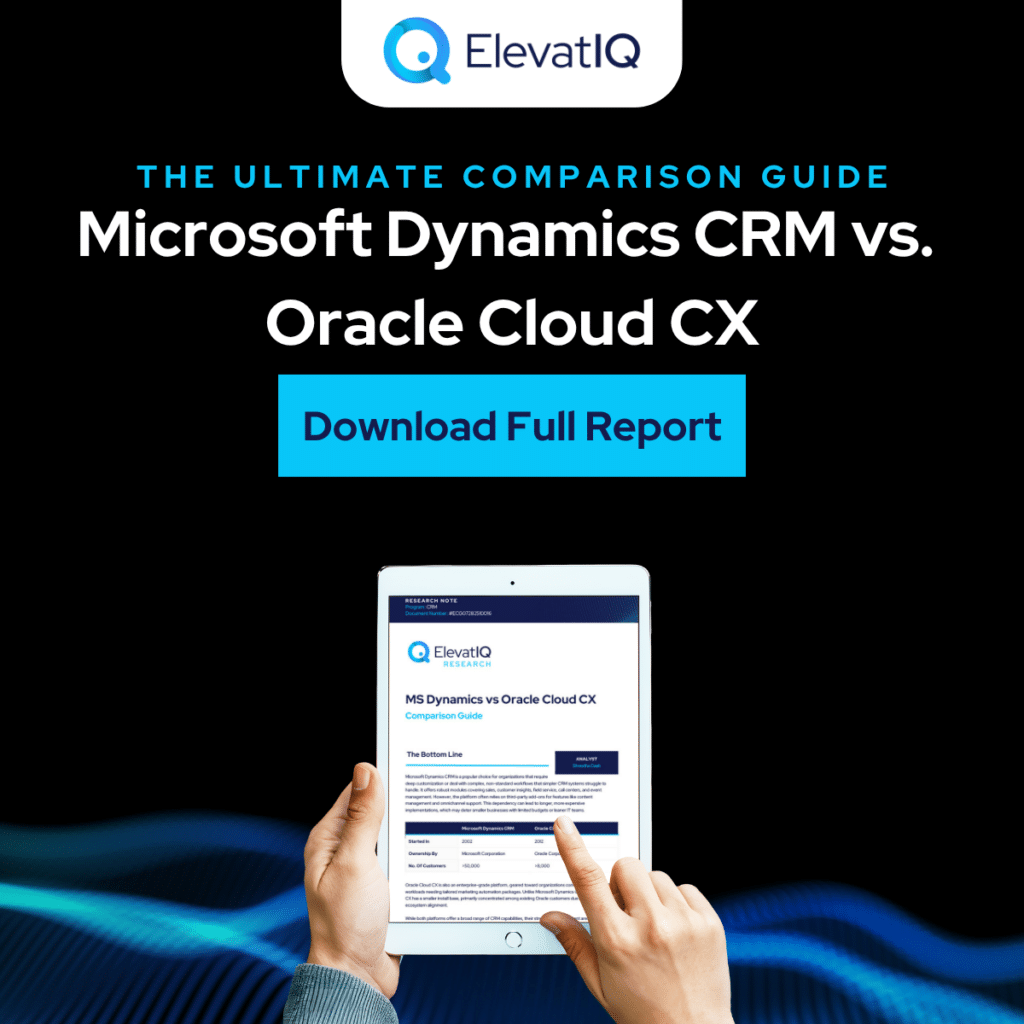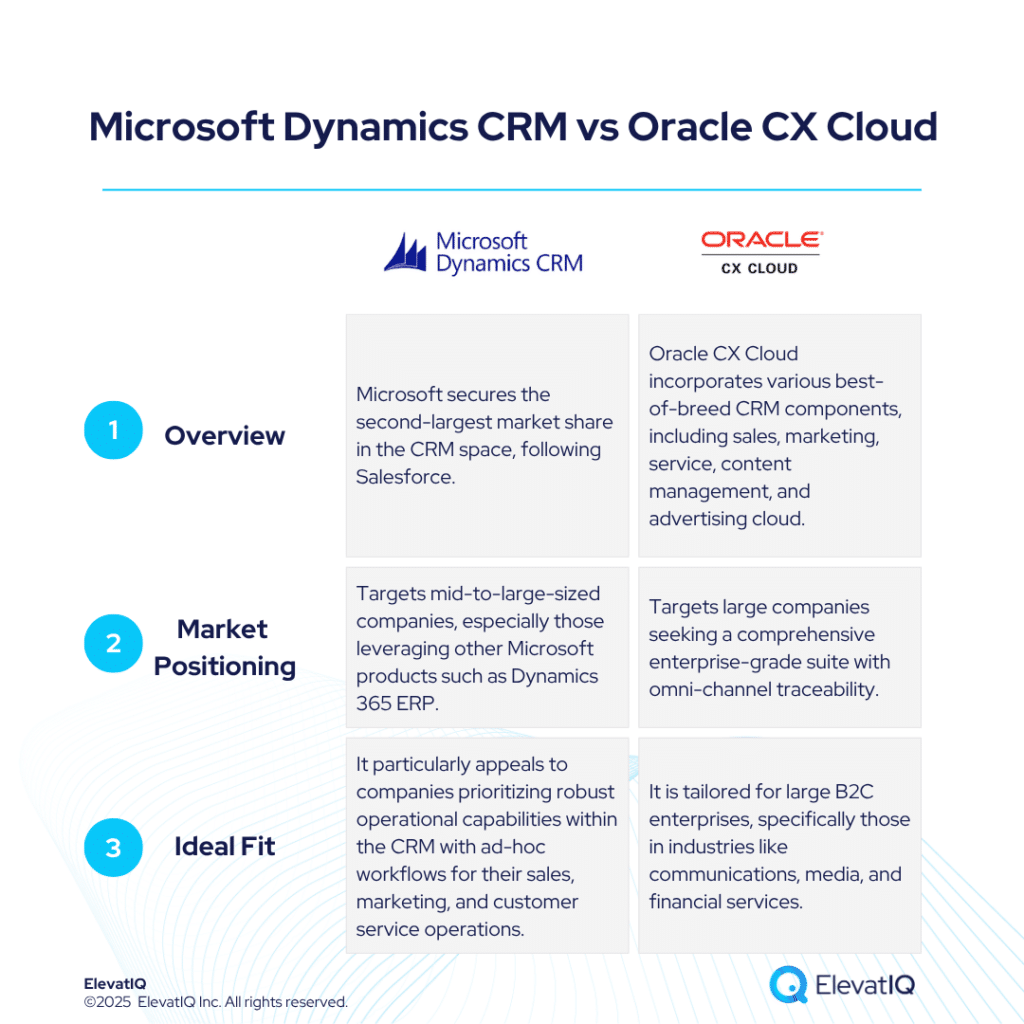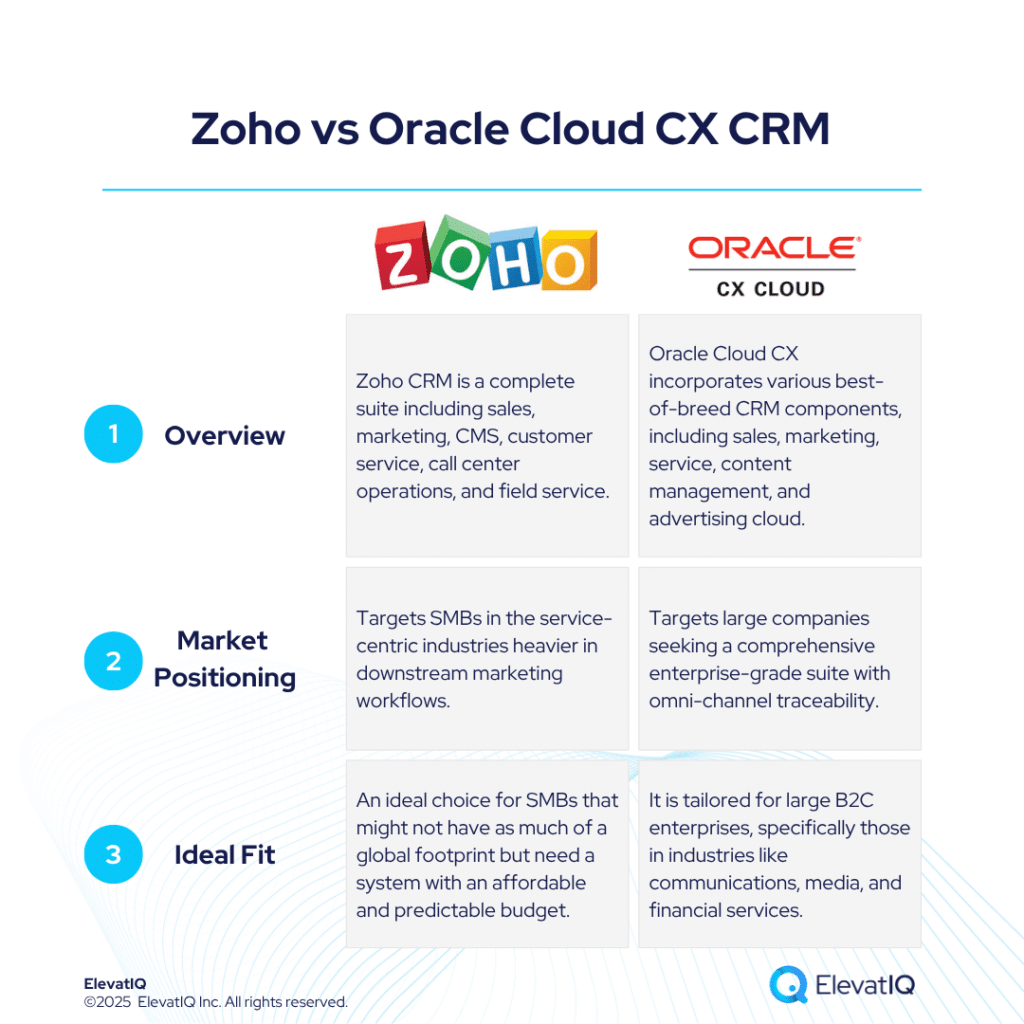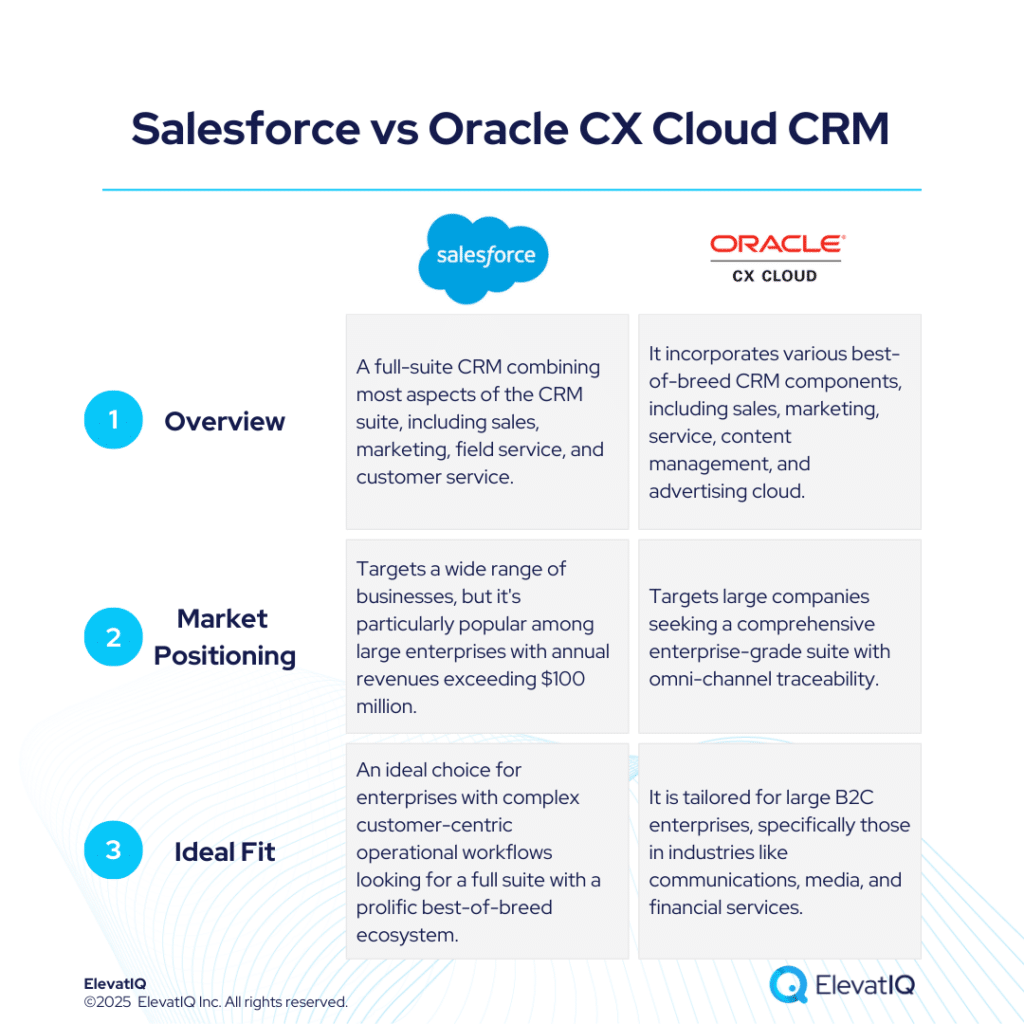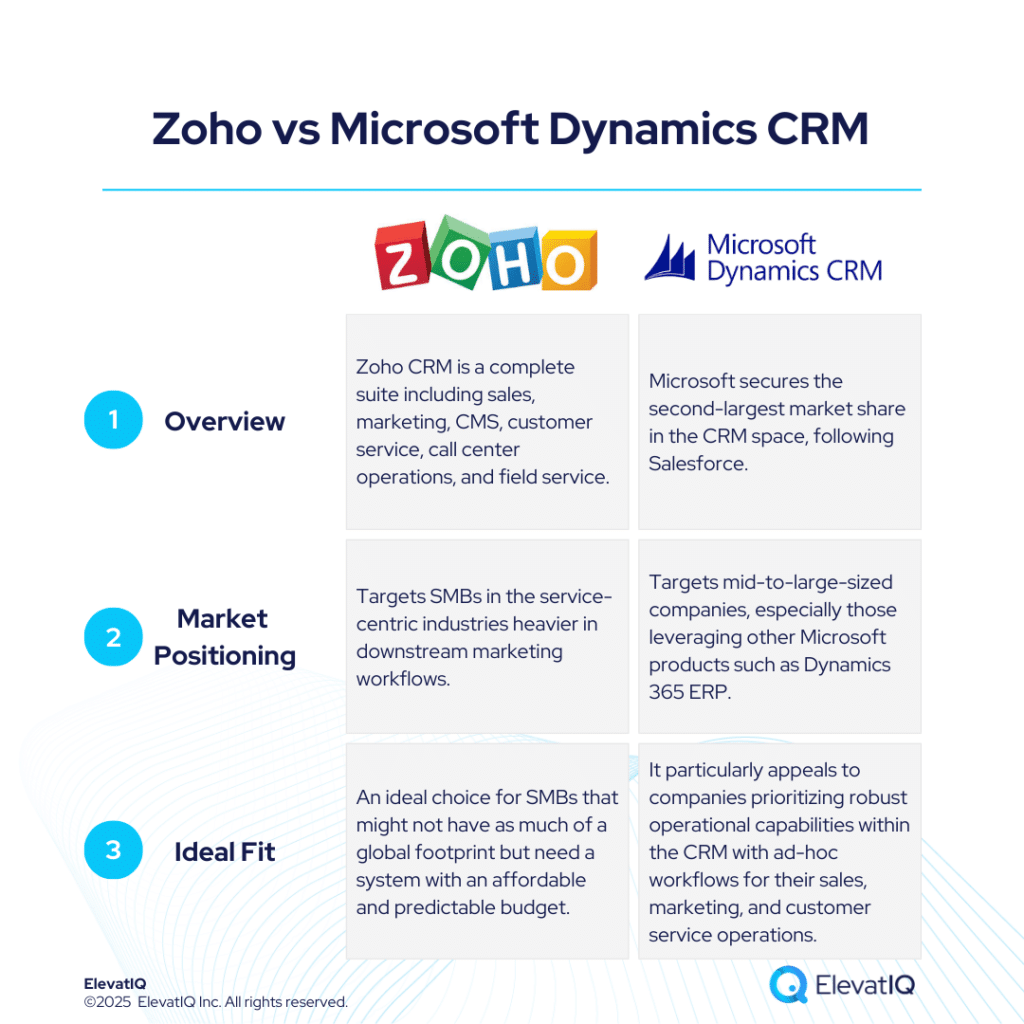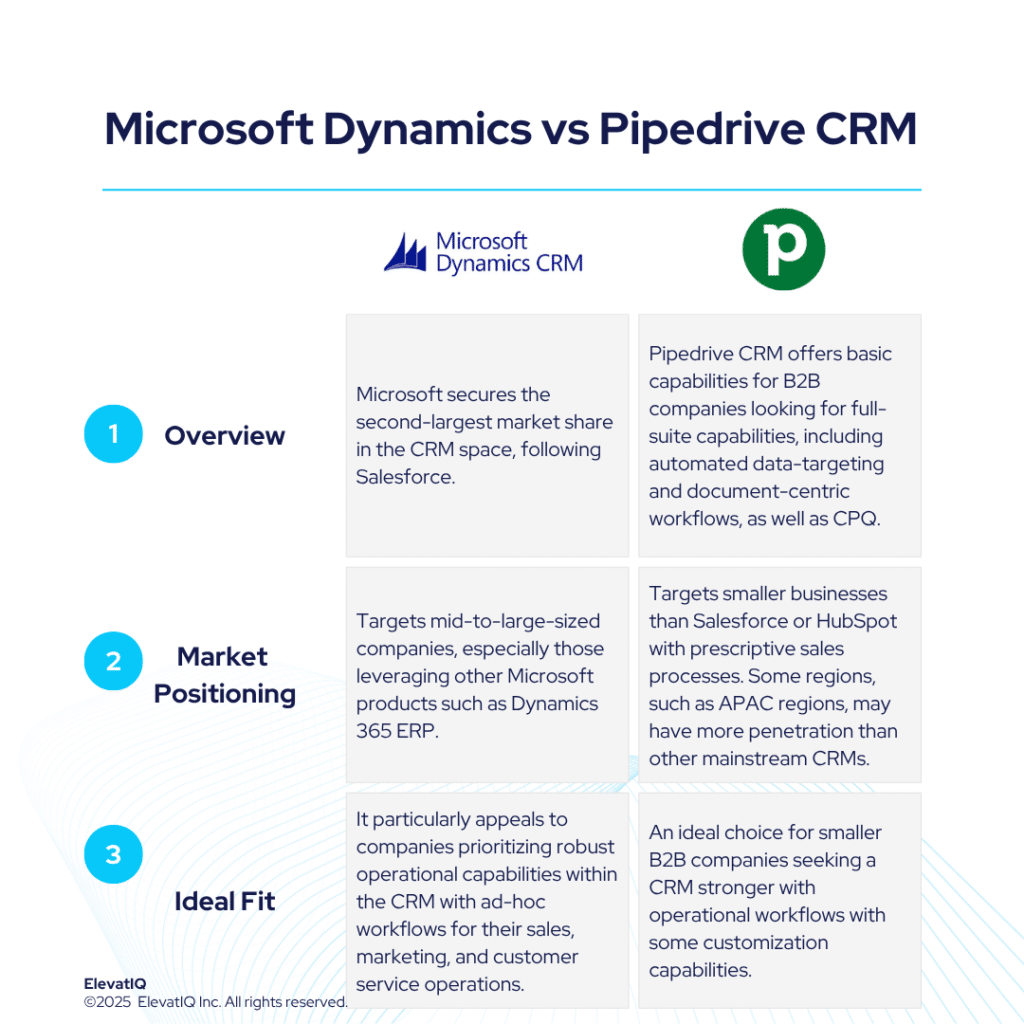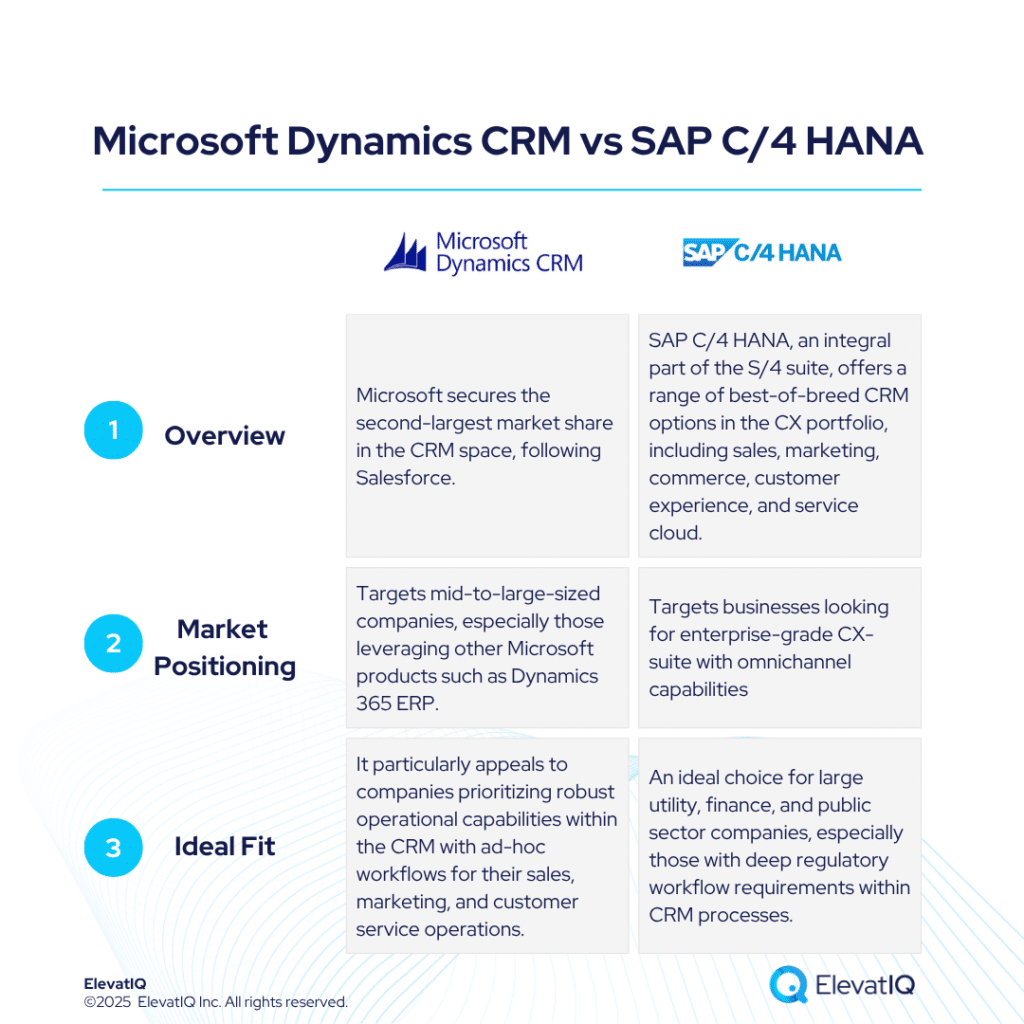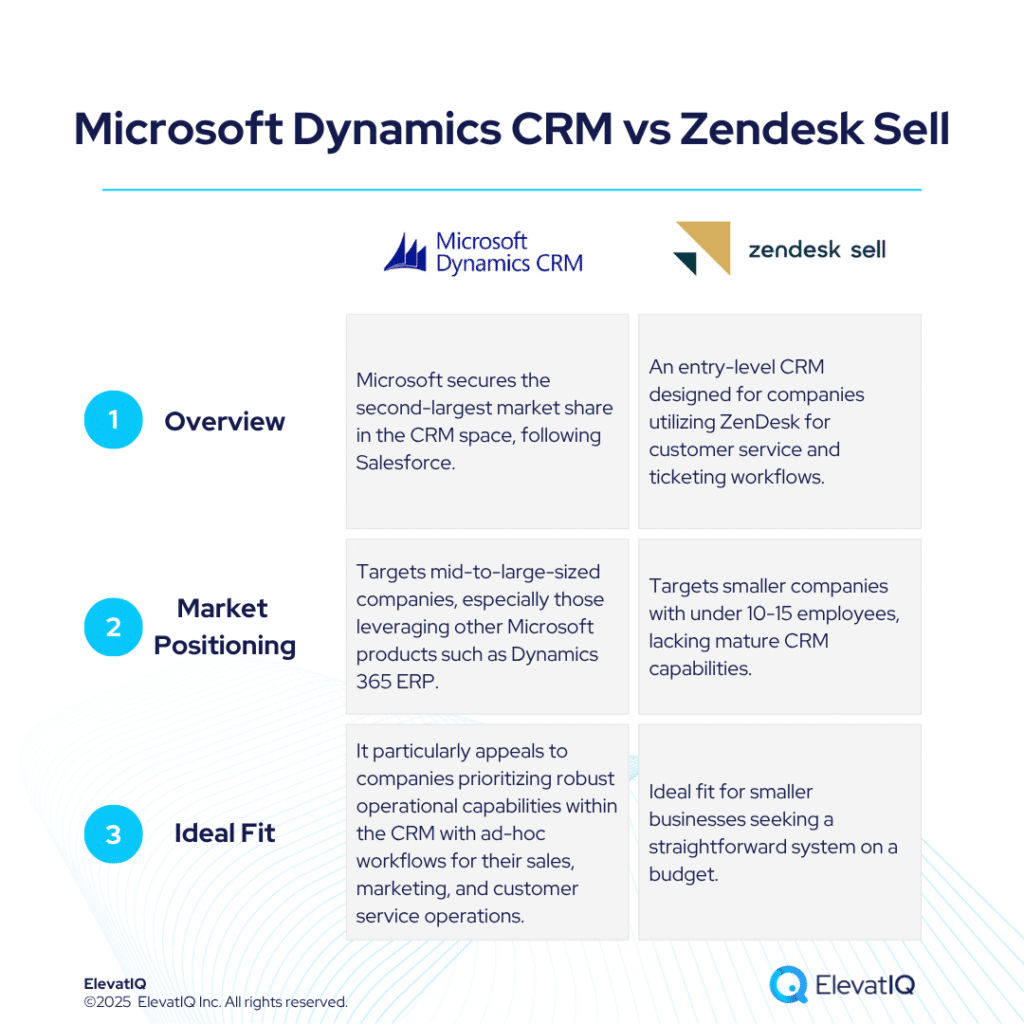Last Updated on August 9, 2025 by Sam Gupta
Microsoft Dynamics CRM is a leading choice for organizations that need extensive customization capabilities or operate with complex workflows that simpler CRM platforms cannot accommodate. With a mature ecosystem and modules covering sales, customer insights, field service, call centers, and event management, it offers breadth and depth across core CRM functions. However, it often relies on third-party add-ons for capabilities like content management and omnichannel engagement. This dependency can increase implementation timelines and costs, making it less ideal for smaller businesses with constrained budgets or minimal IT support.
Oracle Cloud CX, while newer to the market, has positioned itself as an enterprise-grade solution geared toward large organizations seeking to consolidate global CRM workloads—particularly in industries that demand sophisticated marketing automation. Its install base is smaller and more concentrated among existing Oracle customers, reflecting a strategy aligned with Oracle’s broader technology stack. With strengths in consumer-focused sectors such as banking, telecom, and media, Oracle Cloud CX distinguishes itself through enterprise-ready digital asset management tools that support scalable, secure content publishing—an area where Microsoft often depends on third-party vendors.
Ultimately, both platforms support advanced customization and serve distinct market segments. Microsoft Dynamics CRM is better suited for businesses looking for a widely adopted, extensible platform with a vibrant partner ecosystem and strong operational event management features. Oracle Cloud CX, by contrast, may appeal more to large enterprises with existing Oracle investments, particularly those that value built-in marketing and DAM capabilities. However, the use of legacy technologies and a limited consultant pool can pose implementation challenges, potentially increasing complexity and total cost of ownership.
What Is Microsoft Dynamics CRM?
Microsoft Dynamics 365 CRM offers a comprehensive, enterprise-grade solution that integrates tightly with Microsoft’s broader ERP portfolio, making it especially appealing for organizations already embedded in the Microsoft ecosystem. Unlike many competitors, Microsoft bundles its CRM suite with native tools for customer insights, field service, and customer service—while also deeply embedding product and pricing data into the core CRM. This integration supports data consistency and operational rigor, but it also introduces complexity, particularly for sales teams who may struggle with usability during early adoption. Compared to platforms like Salesforce or HubSpot, which emphasize ease of use and faster onboarding, Dynamics 365 often requires more upfront planning, customization, and consulting involvement to fully unlock its potential.
Where Microsoft Dynamics 365 truly differentiates is in its support for both B2B and B2C models—offering advanced tools like Customer Insights that straddle marketing automation and customer data platform capabilities. It also includes powerful, built-in event management workflows that rival those in specialized platforms like Adobe Experience Cloud. But with such a wide scope, buyers need to ask themselves: Do they have the internal resources to manage this level of complexity? Are they prepared to navigate a platform designed to serve both enterprise B2B and B2C use cases? And are they confident the embedded tools fit their specific go-to-market model without adding unnecessary overhead? If you’re weighing the trade-offs between Microsoft Dynamics 365 CRM and Oracle CX Cloud, download the ultimate comparison guide now and make an informed decision tailored to your organization’s needs.
What Is Oracle CX Cloud CRM?
Oracle Cloud CX may not rival Microsoft Dynamics 365 in terms of ecosystem scale or third-party extensibility, but it holds significant appeal for enterprises already invested in Oracle’s broader technology stack—especially those using Oracle Cloud ERP. Oracle’s approach to marketing automation differs notably from Microsoft’s; while Microsoft relies on third-party integrations anchored around a centralized Customer Data Platform (CDP), Oracle includes built-in capabilities acquired through strategic acquisitions. This design offers a more unified experience for marketing teams seeking native tools without relying on external providers. For organizations that prioritize streamlined architecture and centralized control over extensibility, Oracle Cloud CX presents a compelling option.
That said, Oracle Cloud CX’s tightly managed integrations and enterprise-grade security come with trade-offs. Its architecture is often more rigid, leading to higher complexity when implementing non-standard workflows or custom user experiences. Unlike Microsoft Dynamics 365, which offers more flexible mobile and AI workflows, Oracle’s roadmap tends to focus on infrastructure enhancements rather than front-end innovation. So, how important is mobile usability and embedded AI in your CRM strategy? Do you value a broader partner ecosystem, or do you lean toward cohesive, end-to-end control within one vendor? Download the ultimate Microsoft Dynamics CRM vs Oracle CX Cloud comparison guide now to explore these trade-offs in depth and choose the platform that aligns best with your operational goals.
Microsoft Dynamics CRM vs Oracle CX Cloud CRM: Overall Comparison
Both platforms offer enterprise-grade capabilities, but their approaches differ notably across core areas such as data models, CRM feature sets, ecosystem maturity, and integration depth. Microsoft Dynamics CRM is well-known for its seamless integration with the broader Microsoft suite, robust operational tools like advanced territory planning and global compliance, and built-in AI-powered insights. On the other hand, Oracle CX Cloud CRM is particularly strong in marketing automation and compensation planning, offering deep configurability—but often at the cost of increased complexity and higher total cost of ownership.
The decision ultimately hinges on your organization’s technical readiness and business priorities. Do you prefer Microsoft’s predictable pricing and native alignment with familiar tools like Outlook, Teams, and Power Platform? Or does your enterprise require Oracle’s tightly integrated marketing stack and deep customization—despite the steeper learning curve and consulting dependency? Are your internal teams equipped to manage CRM tools with complex data models and interdependencies? If you’re weighing trade-offs between extensibility, ease of use, and enterprise control, download the ultimate Microsoft Dynamics CRM vs Oracle CX Cloud comparison guide now to explore which platform best aligns with your operational goals.
Microsoft Dynamics CRM vs Oracle CX Cloud CRM: Their Module Comparison
Both platforms provide a rich set of features aimed at streamlining operations and boosting overall efficiency. This feature comparison highlights the key differences between Microsoft Dynamics CRM and Oracle CX Cloud CRM across several critical dimensions, offering valuable insights to support informed decision-making. Specifically, this section explores the capabilities of each platform within core functional areas, including marketing, sales, customer service, and e-commerce.
Marketing
Microsoft Dynamics CRM emphasizes streamlined content creation with reusable design blocks and includes essential SEO tools like sitemap and metadata management. It also offers integrated social media management and robust email marketing functionalities, allowing marketers to design, schedule, and personalize campaigns with ease. These tools are particularly beneficial for organizations already embedded in the Microsoft ecosystem, ensuring consistency across campaigns and channels.
Oracle CX Cloud CRM, by contrast, leverages its Oracle Marketing Cloud to deliver a richer content management experience and more advanced automation features. With deeper integrations across its own ecosystem, it supports enhanced segmentation, cross-channel orchestration, and real-time campaign optimization. But which platform best aligns with your marketing operations? Do you need deeper control over content workflows, or is seamless integration with existing tools your top priority? Are you prepared for the resource investment required to unlock the full potential of either platform? Download the ultimate Microsoft Dynamics CRM vs Oracle CX Cloud comparison guide now to uncover which solution truly meets your marketing goals.
Sales
Microsoft Dynamics CRM shines in lead management and sales pipeline visibility, offering intuitive tools for capturing, scoring, nurturing, and converting leads into opportunities—all within a unified interface. It also includes built-in email tracking and meeting scheduling features, helping sales teams stay organized and responsive. Coupled with integrated collaboration tools, Dynamics CRM supports a more cohesive and efficient selling experience, especially for teams working across departments or geographies.
Oracle CX Cloud CRM, on the other hand, provides robust lead and pipeline management tools but often relies on integration with Oracle Marketing Cloud for features like email tracking. While it lacks native meeting scheduling, it does support broader task and activity management, which can be adapted to include meeting coordination. Collaboration capabilities are also present, though not as tightly integrated as in Microsoft’s ecosystem. So which platform fits your sales process better? Do your teams need fully native capabilities, or are you comfortable leveraging external integrations for added flexibility? How important is real-time tracking and scheduling in your current workflow? Download the ultimate Microsoft Dynamics CRM vs Oracle CX Cloud comparison guide now to get a side-by-side view of their features.

Customer Service
When evaluating customer service capabilities, both Microsoft Dynamics CRM and Oracle CX Cloud CRM deliver enterprise-grade tools designed to enhance responsiveness and improve customer satisfaction. Microsoft Dynamics CRM includes a robust ticketing system, live chat through Dynamics 365 Customer Service, and customer support automation tools such as escalation rules and response templates. It also supports omni-channel service delivery, enabling organizations to manage interactions across email, chat, phone, and self-service portals—all while maintaining a unified customer view.
Oracle CX Cloud CRM, primarily through Oracle Service Cloud, matches many of these capabilities with its own strong ticketing infrastructure and live chat features. It stands out with AI-driven recommendations that help agents resolve issues faster and streamline customer interactions through automation. Its omni-channel support tools ensure consistency across touchpoints, providing a cohesive customer experience. But which platform aligns better with your service model? Do you prioritize AI assistance and native Oracle integrations, or seamless multi-channel support embedded within Microsoft’s ecosystem? Download the ultimate Microsoft Dynamics CRM vs Oracle CX Cloud comparison guide now to see which platform best supports your customer service strategy.
E-commerce
Microsoft Dynamics CRM allows businesses to create and manage a detailed product catalog and integrates seamlessly with other Dynamics 365 applications—such as Supply Chain Management—to support end-to-end order fulfillment. It also empowers retailers with customer segmentation, targeted marketing, and AI-driven recommendations, enabling more personalized and relevant shopping journeys.
Oracle CX Cloud CRM similarly provides robust product catalog management tools and integrates with Oracle Order Management Cloud to support order fulfillment workflows. Its strength lies in delivering tailored content and relevant product recommendations, making it a solid choice for businesses focused on personalization at scale. But which solution better supports your e-commerce goals? Does your team need tighter integration with supply chain systems or a more embedded personalization engine? Are you prioritizing catalog flexibility, fulfillment agility, or customer engagement? Download the ultimate Microsoft Dynamics CRM vs Oracle CX Cloud comparison guide now to see which platform is the best fit for your retail and e-commerce strategy.
Microsoft Dynamics CRM vs Oracle CX Cloud CRM: Their Pros
Microsoft Dynamics CRM and Oracle CX Cloud CRM both deliver powerful capabilities tailored for large, complex enterprises—but their strengths cater to different organizational needs. MS Dynamics CRM stands out for its deep integration with other Microsoft products, making it an ideal choice for enterprises already within the Microsoft ecosystem. It supports complex business objects, embeds field service workflows directly into the CRM, and includes advanced features for territory management and global sales compensation. Combined with a shared common data model and database-level replication, it enables high-performance operations and data consistency across departments.
Oracle CX Cloud CRM, on the other hand, is particularly strong in enterprise-grade marketing automation and excels in CPQ processes tailored to telecom and media industries. Its ability to track ad spend across multiple platforms provides valuable insights into customer behavior, helping marketing teams optimize campaigns at scale. But which platform better fits your strategic priorities? Do you require deeper integration across productivity tools, or are industry-specific capabilities like CPQ and advertising insights more critical? Is native field service integration a must-have, or are marketing automation features your top concern? Download the ultimate Microsoft Dynamics CRM vs Oracle CX Cloud comparison guide now to make the right choice for your enterprise.
Microsoft Dynamics CRM vs Oracle CX Cloud CRM: Their Cons
When evaluating usability and adaptability, both Microsoft Dynamics CRM and Oracle CX Cloud CRM present challenges that businesses must consider during implementation. Microsoft Dynamics CRM features tighter dependencies between core objects—such as products, pricing, and accounts—which can make the platform less flexible and more difficult to configure without consulting support. Additionally, its lack of intuitive tools for importing and exporting data (e.g., via CSV files) can slow down adoption, particularly for teams used to more agile CRM platforms. To successfully implement Dynamics CRM, organizations often need substantial change management resources and careful planning.
Oracle CX Cloud CRM faces similar hurdles, largely due to the accumulation of multiple systems within its CX suite, leading to a sometimes clunky and inconsistent user interface. These issues are particularly evident in pre- and post-sales workflows, where usability gaps emerge—especially in B2B contexts requiring seamless transitions between lead generation, sales, and service. Sales teams may also find it difficult to import external opportunities and leads without technical help. So which platform better supports your team’s agility and day-to-day usability? How important is a low-friction onboarding experience versus deep enterprise capabilities? Download the ultimate Microsoft Dynamics CRM vs Oracle CX Cloud comparison guide now to uncover which solution best balances complexity, usability, and long-term scalability.
Download the Full Research Report
